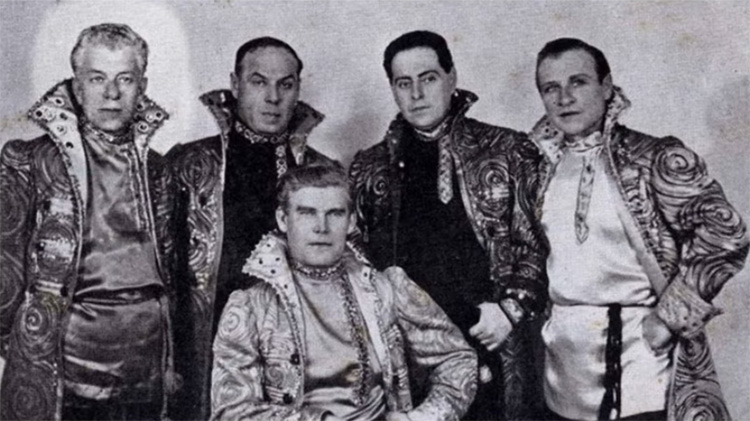He was born into Odessa's Greek minority as the son of a wealthy merchant and owner of three
tanneries, who allowed his son nonetheless to choose an operatic career. Whether or not Krionas made his debut while still in
Tsarist Russia, I don't know; in any case, he left for Greece after the October Revolution, and sang opera in Athens for a few
years, then he emigrated to the USA, where he was a member of the Brooklyn Grand Opera Association in 1923, and of the Ukrainian
Art Theater in 1934.
Other than that, he sang a lot of folk and light music on record, not least with his wife, contralto Anna Criona. Presumably, he
will also have sung that kind of music in concert; definitely so as the second tenor of a successful male quintet called "Russian
Imperial Singers", founded in France in 1931 by baritone Stephen Slepoushkin. The star of the group was the astounding octavist
(basso profondo) Ierinarh (or Irinarch) Zragewsky. Whether Krionas was in France in the first half of the 1930s or whether he
joined the Russian Imperial Singers only in 1935, when they moved to America, I don't know. From 1935 to at least 1940, they were
touring the US (more than 70 concerts alone in their first two years there, i. e. until autumn 1937), Canada (for instance:
Montréal, His Majesty's Theater, 14 November 1937), but even Brazil (for instance: São Paulo, Municipal Theater, 5
April 1940). Krionas, as a member of the Russian Imperial Singers, was announced as Demetre Criona.
Surprisingly, although Krionas/Criona was the quintet's second tenor, he was the only one besides Slepoushkin who sang also solos
during their concerts, and while the group specialized in Russian folk songs, he and Slepoushkin sang operatic arias; in Gloversville
on 18 March 1936, he would sing "E lucevan le stelle" and "Rastsvetali v pole tsvetiki" (from Grechaninov's Dobrynja
Nikitich). Of course, the Russian Imperial Singers sang in Russian, which Krionas knew from childhood. The group made some
beautiful records on Victor.
Reference 1; reference 2: The Morning Herald/Gloversville and
Johnstown, 12 March 1936; reference 3: O estado de S. Paulo, 7 April 1940; reference 4: Le Petit Journal, 7 November 1937; reference 5; reference 6
Picture source
